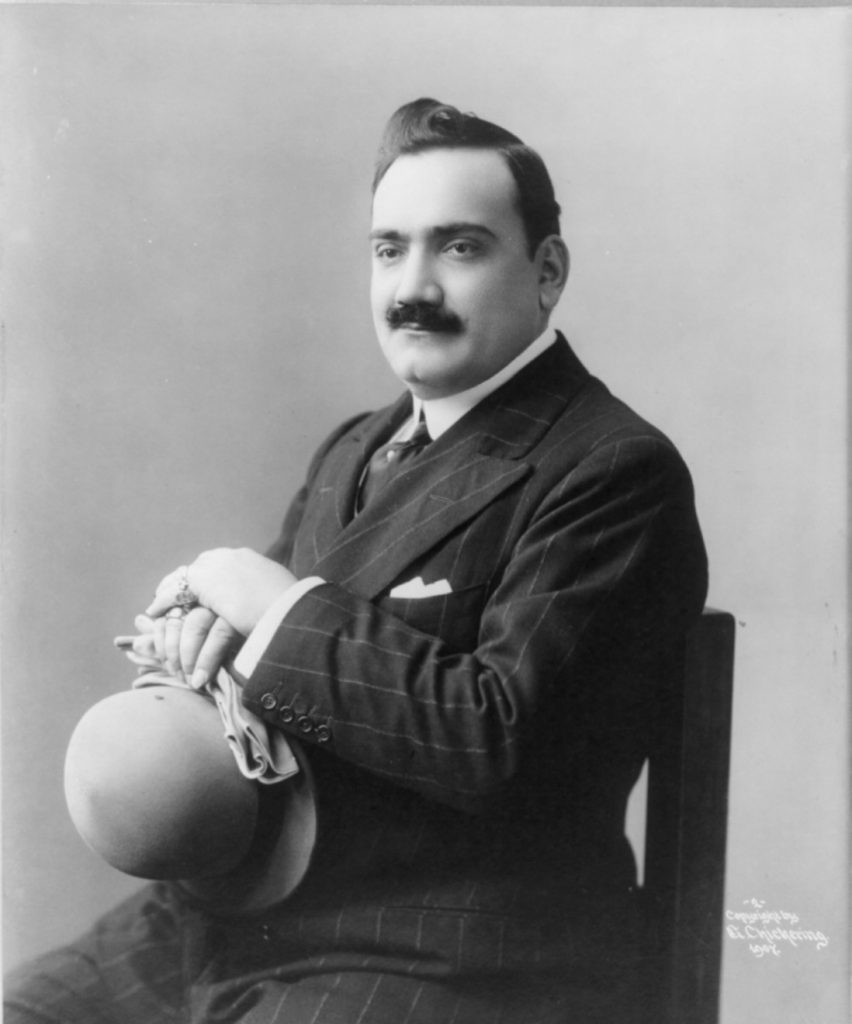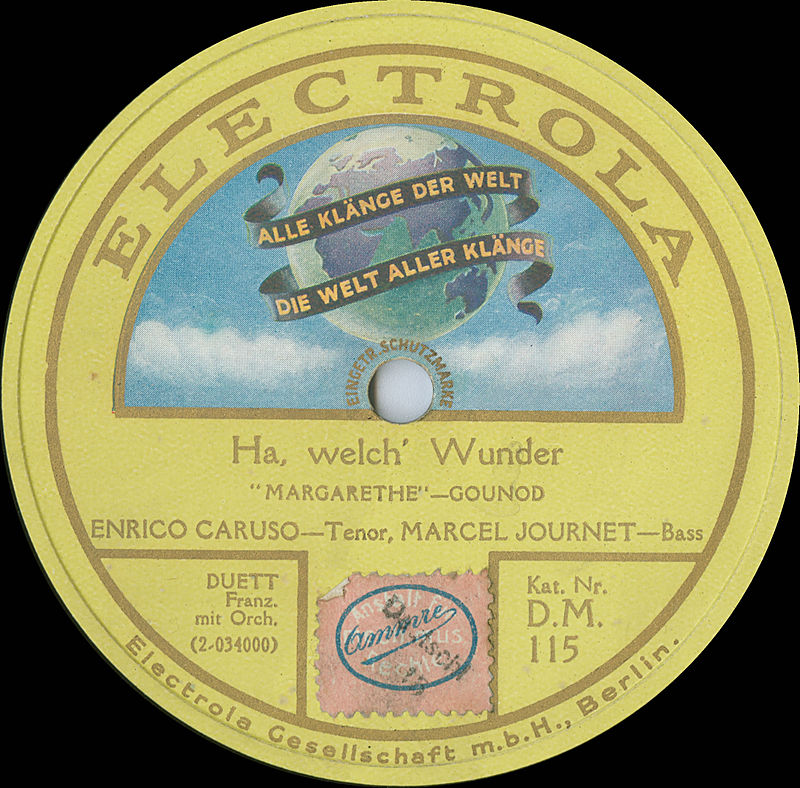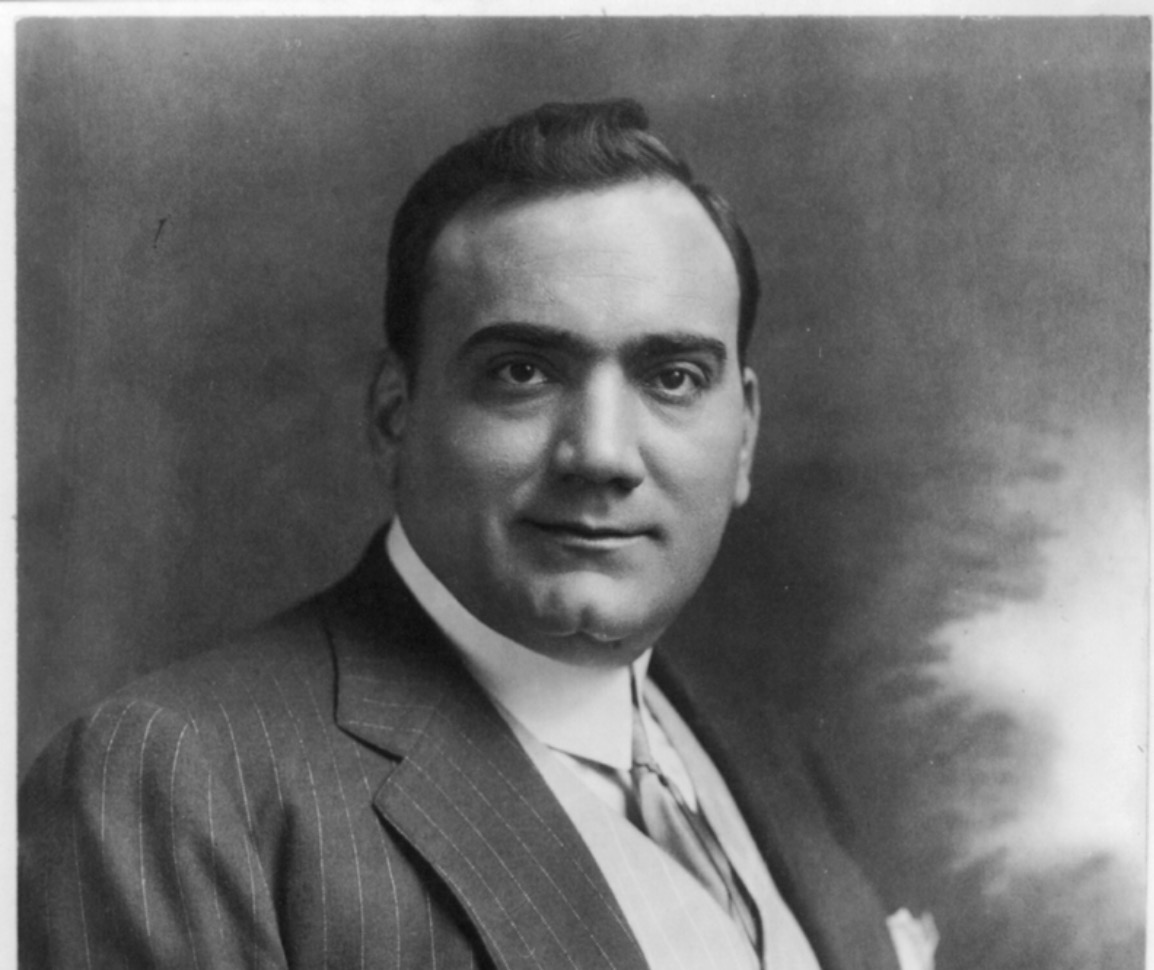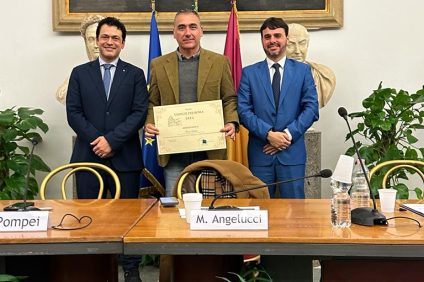Enrico Caruso, one of the greatest Italian tenors of all time. The artist was born on February 25, 1873 in Naples, in the San Carlo all'Arena district of parents of humble origins. His father, Marcellino Caruso (1840-1908) was a metal worker, while his mother, Anna Baldini (1838-1888) was a cleaner. Thanks to his mother's insistence, he enrolls in night school; the first opera arias and the first notions of singing are taught to him by the masters Schirardi and De Lutio.
Enrico Caruso
In 1894 he was drafted, but after only a month and a half he was discharged and sent home so that he could continue singing and studying. He made his debut on March 15, 1895 in Friend Francis by Mario Morelli, earns 80 lire for four performances, then reduced to two (15 and 20 March) due to the low number of public, despite the positive reviews. The performance is not a triumph, but for the first time the newspapers talk about Caruso, together with the baritone Achille Ciabò and the soprano Maria Belvetti. And to the impresario Carlo Ferrara and the theatrical agent Ciccio Zucchi. In 1895 he played Turiddu in Cavalleria Rusticana” at the Cimarosa Theater in Caserta.

He begins to perform in the theaters of Caserta, Naples and Salerno; he makes his first exhibition abroad in Cairo, where he earns 600 lire for a month's work. In 1896 he met Vincenzo Lombardi, the singing teacher thanks to whom he became a great tenor. Vincenzo Lombardi who is also conductor of the orchestra, offers him to accompany him in the summer season in Livorno. Here Caruso meets the soprano Ada Botti Giachetti who is married and mother of a child. He had a relationship with her that lasted eleven years and from which two children were born: Rodolfo (1898-1951) and Enrico junior (1094-1987). Ada then leaves him to flee with Romati, their driver, with whom she also tries to extort money from him. The affair ends up in a courtroom. Giachetti is found guilty and sentenced to three months' imprisonment and a 100-lire fine.
An unrepeatable career, a global success
In 1897 Caruso made his debut at the Teatro Lirico in Milan in the role of Federico ne The Arlesiana by Francesco Cilea. The famous Federico's lament achieves great success. Then it's Loris in Fedora by Umberto Giordano; followed by tours in Russia, Lisbon, Rome and Montecarlo and at Covent Garden in London, where he played the Rigoletto by Giuseppe Verdi. And, again, the following year she performed in Buenos Aires. On 16 May 1897, on the occasion of the inauguration of the Teatro Massimo in Palermo, she ventured into Falstaff by Verdi. It was July 1899 when he played Rodolfo, in the first performance at the Royal Opera House Covent Garden in London of La Bohème by Giacomo Puccini. His brilliant career proceeds at a great pace studded with great successes: in November 1899, at the Teatro Costanzi in Rome, he interprets Osaka in the revival of Iris by Pietro Mascagni; plays the role of Enzo ne La Gioconda by Amilcare Ponchielli e Faust in Mephistopheles.
Caruso sings again at La Scala in the reprise of La Bohème, during the opening night of the opera season, directed by Arturo Toscanini in December 1900. And in 1901, he was in Naples at the Teatro San Carlo, with a fee of 3.000 lire per performance. The chronicles of December 31, 1901 and January 5, 1902 on The Sting, the newspaper that followed the theatrical life of Naples, report the emotion of the tenor in the first act. An emotion broken by growing applause until the request for an encore.
However the severe criticism of Saverio Procida, always on The Sting, greatly annoys Caruso. This, as the critic reproaches him for choosing a repertoire below his vocal and interpretative possibilities. Since then, Caruso no longer sings either in Naples or in any other theater in Italy. On the other hand, he successfully launches tours in the United States and South America.
Record production
On 11 April 1902 in Milan, Caruso recorded ten discs with opera arias on behalf of the English record company Gramophone & Typewriter Company. The Neapolitan artist is the first to try his hand with great success in the new technology hitherto snubbed by the other singers. He is the first artist in history to sell more than a million records with air Wear the jacket from the opera Pagliacci, recorded in the United States in 1904 and 1907 and for the Victor label.
The Victrola single in Caruso's version was awarded the Grammy Hall of Fame Award. Between 1909 and 1911 Caruso also recorded a series of twenty-two Neapolitan songs which also included Ingrate heart, written by Riccardo Cordiferro and Salvatore Cardillo, inspired by his sentimental events.
Also in 1909 he was operated on in Milan for hypertrophic laryngitis, an operation which at first did not jeopardize his career, so much so as to allow him to continue his tours around the world, without neglecting performances for charity during the war period.

After a long tour in North America, in 1920, the tenor's health began to deteriorate. On 11 December, the tenor suffered a heavy haemorrhage from his throat; on 24 December he makes his last appearance with Eléazar in Jewish. On Christmas day, the pain becomes unbearable and he is diagnosed with infected pleurisy.
Illness and death
Operated on December 30 on the left lung, he spent his convalescence in Italy, in Sorrento. Unfortunately, a subphrenic abscess develops here. The first young doctor contacted does not assume the responsibility of engraving him, telling him "I don't feel up to putting my hands on Caruso!". When Professor Antonio Cardarelli finally arrives from Rome, he decides that the tenor needs to be operated on urgently. But the hospital in Naples was not equipped enough and the artist had therefore to be transferred to Rome. Transported from Sorrento to Naples, in an attempt to reach Rome, Caruso died on 2 August 1921 at the age of 48. He is buried in Naples, in a private chapel in the cemetery of Santa Maria del Pianto in via Nuova del Campo. A few meters from his grave rests the prince Antonio de Curtis, the great Totò.
(Commons Wikimedia public domain images)





